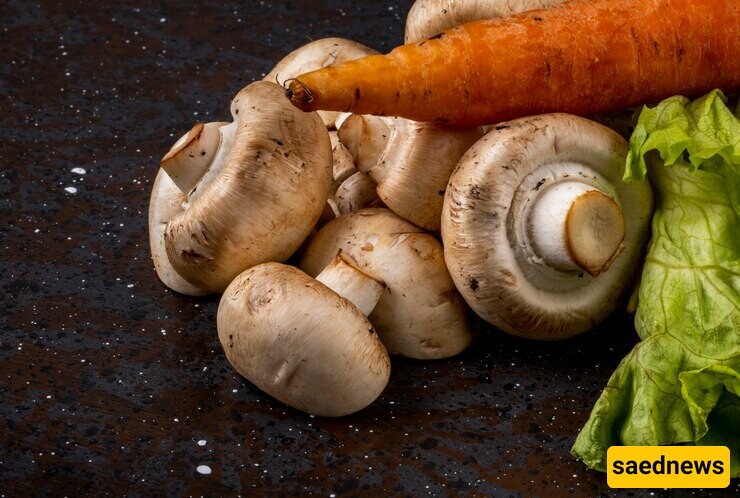SAEDNEWS: Mushrooms are one of the most popular and widely consumed plants in the world, with over 100,000 different species. To learn more about the benefits and drawbacks of mushrooms, stay with SaedNews.


Edible mushrooms are an excellent source of fiber and unsaturated fatty acids while being low in calories, which might seem surprising. However, mushrooms can also be beneficial for the skin. They contain vitamin D, selenium, and antioxidants that protect your skin. Mushrooms are now used in topical creams and serums as well.
Mushrooms are highly popular for their unique flavor and health benefits, and they are packed with nutrients. Edible mushrooms have good nutritional value and help strengthen the immune system. However, to benefit from these properties, it is essential to choose the right mushrooms. It is recommended to buy mushrooms cautiously from reputable stores.
In the past, mushrooms were used as additives in herbal medicines and potions and were often associated with wizards and their magical powers. However, mushrooms are a rich source of protein and can have a significant place in our diets without any magical connotation.
Mushrooms contain potassium, various vitamins, and antioxidants, all of which are essential for good health. Additionally, mushrooms, being plants, have enough fiber to improve digestive system function. Edible mushrooms are also a good source of unsaturated fatty acids while being low in calories, making them an excellent dietary addition.
The most commonly cultivated and consumed mushroom is the button mushroom, often found in salads and various dishes. In East Asian countries, button mushrooms are also used as part of treatments for allergic diseases, arthritis, bronchitis, and to prevent stomach, esophagus, and colon cancer.
To maintain mushrooms' freshness and beneficial properties, consider the following tips:
Proper storage preserves their freshness.
Store mushrooms in their original packaging or paper bags.
You can keep purchased mushrooms in a paper bag in the lower refrigerator shelf for up to a week.
Fresh mushrooms can be frozen for up to a month.
Keep mushrooms away from moisture.
Mushrooms absorb odors easily, so store them away from other foods.
If storing for over a week, freeze them.
The white mushroom (Agaricus bisporus), also known as the button mushroom, is the most widely consumed mushroom globally, making up about 90% of mushrooms consumed in the United States.
White mushrooms are incredibly low in calories and offer numerous health benefits, including improved heart health and reduced cancer risk. They also provide higher protein content compared to most vegetables, making them an ideal protein source for vegetarians.
White mushrooms can be harvested at various stages of maturity. Mature and immature button mushrooms may appear white or have brownish hues. When fully grown, they become larger and darker and are known as portobello mushrooms.
These mushrooms have a small stem, a smooth umbrella-shaped cap, and a mild flavor, making them suitable for various dishes. White mushrooms grow in compost soil alongside many other fungi and bacteria, which play an essential role in breaking down raw materials for mushroom growth. They can be found fresh, frozen, canned, dried, or powdered.
Mushrooms are delicious edible fungi with diverse shapes, textures, colors, and health benefits. They are saprophytic, meaning they derive nutrients from decaying plants and animals. Mushrooms are beneficial for preventing high cholesterol, breast and prostate cancer, and diabetes, while also aiding in weight loss and strengthening the immune system.
Mushrooms are cholesterol- and fat-free and low in carbohydrates, providing plenty of low-fat protein. Their fiber and specific enzymes help reduce blood cholesterol levels. The protein in mushrooms also aids in burning cholesterol during digestion, maintaining a healthy balance between bad cholesterol (LDL) and good cholesterol (HDL).
Mushrooms are a good source of iron, with 90% of it being absorbable by the body. Increased iron intake supports red blood cell production, improving overall health and energy levels.
Mushrooms are rich in beta-glucans and conjugated linoleic acid, which have anti-cancer properties. Linoleic acid helps regulate excess estrogen levels, reducing the risk of breast cancer, while beta-glucans inhibit prostate cancer cell growth.
Mushrooms are ideal for diabetic diets as they are low in energy, fats, and carbohydrates but rich in protein, vitamins, minerals, and water. They contain natural insulin and enzymes that help break down sugars and starches.
Rich in calcium, mushrooms strengthen bones, reduce the risk of osteoporosis, and prevent joint pain.
Mushrooms are one of the few non-animal sources of vitamin D, which enhances calcium and phosphorus absorption.
Mushrooms contain ergothioneine, a powerful antioxidant and amino acid that protects the body from free radicals and boosts immunity.
The potassium in mushrooms helps relax blood vessels, lowering blood pressure and preventing cardiovascular diseases.
Copper in mushrooms enhances iron absorption and regulates its storage and release from the liver.
Mushrooms are rich in selenium, a potent antioxidant essential for bone health, and maintaining healthy teeth, nails, and hair.
With low calories, high protein, and fiber, mushrooms are excellent for weight management. Replacing red meat with mushrooms can significantly aid in sustainable weight loss.

Choose firm, dry mushrooms without blemishes.
Avoid slimy or shriveled mushrooms.
Packaged mushrooms are preferable to loose ones.
Do not wash mushrooms until ready to cook.
Store mushrooms in the refrigerator.
Before cooking, wash mushrooms thoroughly and trim stems if necessary.
Never pick wild mushrooms without proper training, as many are highly toxic.
Stir-fried with onions on high heat
Raw in salads
Stuffed mushrooms
Added to omelets
Grilled mushroom slices in sandwiches
Brewed as mushroom tea (e.g., Reishi and Chaga mushrooms)
Mushrooms are versatile, nutritious, and flavorful, making them a fantastic addition to any diet. Enjoy them in your favorite dishes while benefiting from their numerous health properties.

